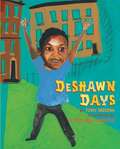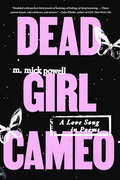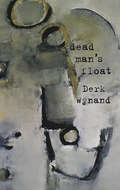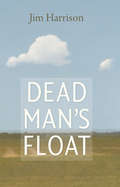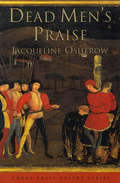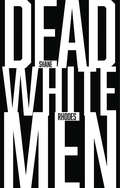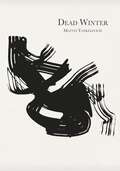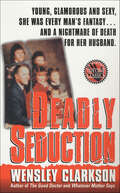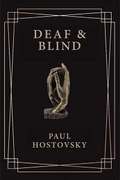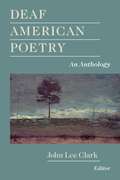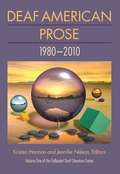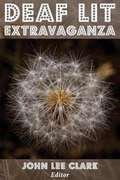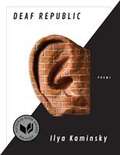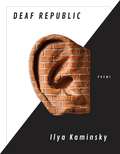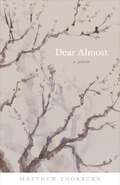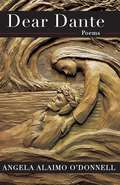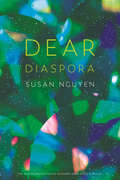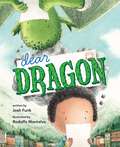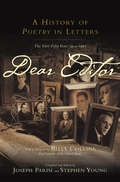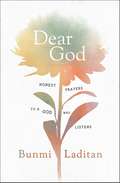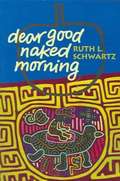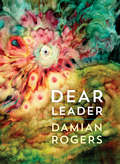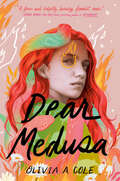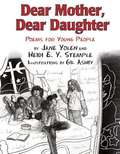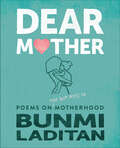- Table View
- List View
DeShawn Days
by Tony Medina R. Gregory ChristieI'm DeShawn Williams I'm ten years old come see who I live with -- who I love! From this inviting opening, we are swept into ten-year-old DeShawn's world where we meet his family, his friends, and learn about his hopes and dreams. DeShawn lives in the projects, where "You don't just hear music / you hear sirens too /cop cars and ambulances /screaming all the time /real loud at you." This is also a place where neighbors gather for barbecues, and where DeShawn and his cousin build a snowman in the winter. We experience the death of DeShawn's grandmother, deeply feeling his sadness and loss. And we share the hope as he and his mother turn to each other for comfort. Readers from all backgrounds will be charmed by this upbeat, compassionate, and creative young boy.
Dead Girl Cameo: A Love Song in Poems
by m. mick powellA dazzling docupoetic debut collection interweaving personal loss with the life stories of Aaliyah Haughton, Whitney Houston, Lisa &“Left Eye&” Lopes, Phyllis Hyman, Selena Quintanilla-Pérez, and others to explore sexuality, survival, queer mourning, and the afterlives of stardom&“Poet m. mick powell&’s debut collection . . . resurrects their vivid lives and artistry to paint a more humanizing picture of their legacy.&”—USA Today&“I made, of my bones, an earth for you: turned the oceansyour favorite shade of light, that deepened, nearly bruiseddusk. Reflected in my palms, what I&’ve made into waterglows amethyst&”In m. mick powell&’s polyphonic, haunting debut, a chorus of voices conjures up intimate pop herstories to map how the poet&’s queer Black girlhood was molded by their memory. With tender reverence, powell meditates on the deaths of her own beloveds while reflecting on the many stages of an icon&’s life: How did these women challenge conventional representations of Black femininity and transform the musical landscape? How did they navigate abuse and alienation in the limelight? How do the mythologies that survive them establish afterlives of queer femme possibility?Through sensual imagery, speculative verse, and splendid wordplay, Dead Girl Cameo takes us beyond the headlines, innovating a Black feminist poetic that traverses the richly textured realms of grief, girlhood, love, widowing, femme friendship, and queer fandom.
Dead Man's Float
by Derk WynandDead Man's Float details that sad emblem of Western alienation, the tourist couple in their rented tropical Eden. Here life is temporary and not at all cheap. The wildlife is spectacular, the culture incomprehensible, and the locals politely try to hide their hilarity at Canadian pidgin Spanish. Heat, beaches, ruins -- why did we think they could distract us from domestic squabbling or the 3 a.m. dreads? Derk Wynand wrings wry existential meditations from firsthand experience of the Exotic -- the First World and the Third in their ritual winter dance.
Dead Man's Float
by Jim Harrison"Harrison's poems succeed on the basis of an open heart and a still-ravenous appetite for life."-The Texas ObserverThe title Dead Man's Float is inspired by a technique used by swimmers to conserve energy when exhausted, to rest up for the long swim to shore. In his fourteenth volume of poetry, Jim Harrison presents keen awareness of physical pains, delights in the natural world, and reflects on humanity's tentative place in a universe filled with ninety billion galaxies. By turns mournful and celebratory, these fearless and exuberant poems accomplish what Harrison's poems always do: wake us up to the possibilities of being fully alive."Forthright and unaffected, even brash, Harrison always scoops us straight into the world whether writing fiction or nonfiction. This new collection [Dead Man's Float] takes its cue from a technique swimmers use to conserve energy in deep water, and Harrison goes in deep, acknowledging our frailness even as he seamlessly connects with a world that moves from water to air to the sky beyond."-Library Journal"Harrison pours himself into everything he writes... in poems, you do meet Harrison head-on. As he navigates his seventies, he continues to marvel with succinct awe and earthy lyricism over the wonders of birds, dogs, and stars as he pays haunting homage to his dead and contends with age's assaults. The sagely mischievous poet of the North Woods and the Arizona desert laughs at himself as he tries to relax by imagining that he's doing the dead man's float only to sink into troubling memories...Bracingly candid, gracefully elegiac, tough, and passionate, Harrison travels the deep river of the spirit, from the wailing precincts of a hospital to a "green glade of soft marsh grass near a pool in a creek" to the moon-bright sea."-Donna Seaman, Booklist"Harrison doesn't write like anyone else, relying entirely on the toughness of his vision and intensity of feeling."-Publishers WeeklyWarblerThis year we have two gorgeousyellow warblers nesting in the honeysuckle bush.The other day I stuck my head in the bush.The nestlings weigh one twentieth of an ounce,about the size of a honeybee. We stared ateach other, startled by our existence.In a month or so, when they reach the sizeof bumblebees they'll fly to Costa Rica without a map.Jim Harrison, one of America's most versatile and celebrated writers, is the author of over thirty books of poetry, fiction, and nonfiction-including Legends of the Fall, the acclaimed trilogy of novellas. With a fondness for open space and anonymous thickets, he divides his time between Montana and southern Arizona.
Dead Men's Praise: Poems (Grove Press Poetry Series)
by Jacqueline OsherowA witty and formally versatile collection of poetry exploring life, faith, and history by the Witter Bynner Prize-winning poet.With Dead Men’s Praise, Jacqueline Osherow gives us her fourth and most ambitious collection of poetry to date. Her hybrid inspiration ranges from Dante’s terza rima, to free verse, to biblical psalms, all delivered in a casually conversational voice. Combining the self-mocking inflections of Yiddish jokes with the pure lyric inspiration of biblical verse, these poems range in theme from Italian hill towns to contemporary art installations in Los Angeles to the vanished Jewish world of the Ukraine. Her effortless humor and sharp insights take us from imaginings of the future to recovery of the past, and her distinctive voice becomes a fusion of the sublime and the down-to-earth.“Like Elizabeth Bishop, who wove her voice into a sestina so effortlessly you forget the form is there, Osherow makes villanelles, sonnets, and even Dante’s terza rima feel genuinely conversational.” —David Yaffe, The Village Voice
Dead White Men
by Shane RhodesA vital collection that interrogates the stories of the dead white men that litter our histories and landscapes. Juxtaposing the seemingly benign names of Europeans that permeate our geographies with the details of their so-called discoveries and conquests, Dead White Men turns ideas of exploration, discovery, finding and keeping back upon themselves. Engaging with exploration and scientific texts from the fifteenth to the nineteenth centuries – texts wrapped up in the history and ongoing present of colonization – this collection builds a fascinating poetry of memory out of histories that are largely forgotten. ‘A provocative and galvanizing read … Riveting and dazzling invention is visible on almost every page: fonts shift size, language cascades and cleaves, and images disrupt order. Dead White Men should be widely read and taught.’ – Eduardo C. Corral, author of Slow Lightning ‘Dead White Men is not only a searing indictment of colonialism but also a painful reminder of the violence that underpins the logic of exploration. Each poem strikes at the heart of the issue: there are often unarticulated, unacknowledged Indigenous presences here that have been flattened over by the lies and mirages of empty landscapes. Dead White Men is a stinging and difficult journey, and one that continues to remind us that stolen land has always been the most pressing concern for Indigenous peoples and settlers. This is an absolutely essential book.’ – Jordan Abel, author of Injun
Dead Winter
by Matvei YankelevichThese twenty-seven poems of Dead Winter continue the poet’s ongoing “From a Winter Notebook” cycle which plays on traditional winter themes of stasis, ruin, aging, lost love, belatedness, dormancy, and decline. Aggressively personal, by turns ironic and sentimental, mixing colloquial and archly artificial diction, rife with quotations and reference to a wide variety of lyric traditions, these poems stage a polyphonic and ambivalent internal dialog that vacillates between the often-contradictory desires of social justice and personal freedom. Straining to resist impending erosion in the political tide, the singular voice seeks to hold these contradictions up to the light and to contemplate their prismatic refractions without resolution. Caught between complicity and antagonism, between the impending obsolescence of inherited poetic traditions and a desire to commune with the contemporary, the voice churns on—miming winter’s monotony—to carve out a space for melancholic complaint and anxious meditation on the end-times endeavor of the lyric mode itself. Through representations of desire and melancholy in a technologically invasive era, these poems also ask about the effect of technological and political shifts on the bounds of the personal, and of the way a techno-oriented sociality impinges on interpersonal relationships, the interior dialogs of the self, and the writing of poetry.
Deadly Seduction (St. Martin's True Crime Classics)
by Wensley Clarkson***Please note: This ebook edition does not contain the photos found in the print edition.***Young, Glamorous and Sexy, She Was Every Man's Fantasy...And A Nightmare of Death For Her Husband.She Hid Her Criminal Past...Prominent Indiana attorney Jimmy Grund thought he'd found the woman of his dreams when he wed his second wife Susan. But beneath the silky blond society lady lurked a calculating, evil-tempered seductress whose murderous future was about to rival her sordid past.She Plotted A Brutal Murder...While she hid her previous marriages and an appalling crime from Jimmy, she was soon plotting to get her hands on his fortune. When Jimmy Grund finally found out the truth about his wife, he told her he was divorcing her. But no one left Susan Grund.She Killed Her Husband With A Gun Stolen From His Own Son...All of Peru, Indiana was stunned when it was revealed the fatal bullet came from a gun stolen from young David Grund. Yet even that paled next to Susan's incredible testimony that she had carried on a two-year affair with the innocent teenager, who denied the affair and was not implicated in the crime.Wensley Clarkson's Deadly Seduction is the story of a real femme fatale, who spun a web of deceit and murder that shocked an entire town.
Deaf & Blind
by Paul HostovskyA collection of poems and stories about Deaf and DeafBlind people, ASL and Braille.
Deaf American Poetry: An Anthology
by John Lee Clark<p>“The Deaf poet is no oxymoron,” declares editor John Lee Clark in his introduction to <i>Deaf American Poetry: An Anthology</i>. The 95 poems by 35 Deaf American poets in this volume more than confirm his point. From James Nack’s early metered narrative poem “The Minstrel Boy” to the free association of Kristi Merriweather’s contemporary “It Was His Movin’ Hands Be Tellin’ Me,” these Deaf poets display mastery of all forms prevalent during the past two centuries. Beyond that, E. Lynn Jacobowitz’s “In Memoriam: Stephen Michael Ryan” exemplifies a form unique to Deaf American poets, the transliteration of verse originally created in American Sign Language. <p>This anthology showcases for the first time the best works of Deaf poets throughout the nation’s history — John R. Burnet, Laura C. Redden, George M. Teegarden, Agatha Tiegel Hanson, Loy E. Golladay, Robert F. Panara, Mervin D. Garretson, Clayton Valli, Willy Conley, Raymond Luczak, Christopher Jon Heuer, Pamela Wright-Meinhardt, and many others. Each of their poems reflects the sensibilities of their times, and the progression of their work marks the changes that deaf Americans have witnessed through the years. In “The Mute’s Lament,” John Carlin mourns the wonderful things that he cannot hear, and looks forward to heaven where “replete with purest joys/My ears shall be unsealed, and I shall hear.” In sharp contrast, Mary Toles Peet, who benefitted from being taught by Deaf teachers, wrote “Thoughts on Music” with an entirely different attitude. She concludes her account of the purported beauty of music with the realization that “the music of my inward ear/Brings joy far more intense.” <p>Clark tracks these subtle shifts in awareness through telling, brief biographies of each poet. By doing so, he reveals in <i>Deaf American Poetry</i> how “the work of Deaf poets serves as a prism through which Deaf people can know themselves better and through which the rest of the world can see life in a new light.”</p>
Deaf American Prose, 1980–2010
by Jennifer L. Nelson Kristen C. HarmonIn Deaf life, the personal narrative holds sway because most Deaf individuals recall their formative years as solitary struggles to understand and to be understood. Few deaf people in the past related their stories in written form, relying instead on a different kind of "oral" tradition, that of American Sign Language. During the last several decades, however, a burgeoning bilingual deaf experience has ignited an explosion of Deaf writing that has pushed the potential of ASL-influenced English to extraordinary creative heights. Deaf American Prose: 1980-2010 presents a diverse cross-section of stories, essays, memoirs, and novel excerpts by a remarkable cadre of Deaf writers that mines this rich, bilingual environment. The works in Deaf American Prose frame the Deaf narrative in myriad forms: Tom Willard sends up hearing patronization in his wicked satire "What Exactly Am I Supposed to Overcome?" Terry Galloway injects humor in "Words," her take on the identity issues of being hard of hearing rather than deaf or hearing. Other contributors relate familiar stories about familiar trials, such as Tonya Stremlau's account of raising twins, and Joseph Santini's short story of the impact on Deaf and hearing in-laws of the death of a son. The conflicts are well-known and heartfelt, but with wrinkles directly derived from the Deaf perspective. Several of the contributors expand the Deaf affect through ASL glosses and visual/spatial elements. Sara Stallard emulates ASL on paper through its syntax and glosses, and by eliminating English elements, a technique used in dialogue by Kristen Ringman and others. Deaf American Prose features the work of other well-known contemporary Deaf writers, including co-editor Kristen Harmon, Christopher Jon Heuer, Raymond Luczak, and Willy Conley. The rising Deaf writers presented here further distinguish the first volume in this new series by thinking in terms of what they can bring to English, not what English can bring to them.
Deaf Lit Extravaganza
by John Lee ClarkThis celebration of short stories, poems, and essays gives us a glimpse into the Deaf signing community, something that literature by hearing authors featuring deaf characters has rarely done. Between these covers, a Deaf couple fights over their son's language use, an Australian woman joins the community as an adult, a Deaf woman's body is fished out a dumpster, and a British Deaf poet wants to keep "zombies"-hearing people-out.
Deaf Republic: Poems
by Ilya KaminskyFinalist for the National Book Award*Finalist for the PEN/Jean Stein Award*Finalist for the National Book Critics Circle Award* Winner of the Los Angeles Times Book Prize*Winner of the Anisfield-Wolf Book Award*Winner of the National Jewish Book Award*Finalist for the Kingsley Tufts Poetry Award *Finalist for the T. S. Eliot Prize* Finalist for the Forward Prize for Best Collection Ilya Kaminsky's astonishing parable in poems asks us, What is silence? This book opens in an occupied country in a time of political unrest. When soldiers breaking up a protest kill a deaf boy, Petya, the gunshot becomes the last thing the citizens hear--they all have gone deaf, and their dissent becomes coordinated by sign language. The story follows the private lives of townspeople encircled by public violence: a newly married couple, Alfonso and Sonya, expecting a child; the brash Momma Galya, instigating the insurgency from her puppet theater; and Galya's girls,heroically teaching signing by day and by night luring soldiers one by one to their deaths behind the curtain. At once a love story, an elegy, and an urgent plea, Ilya Kaminsky's long-awaited Deaf Republic confronts our time's vicious atrocities and our collective silence in the face of them.
Deaf Republic: Poems
by Ilya KaminskyFinalist for the National Book Award • Finalist for the PEN/Jean Stein Award • Finalist for the National Book Critics Circle Award • Winner of the Los Angeles Times Book Prize • Winner of the Anisfield-Wolf Book Award • Winner of the National Jewish Book Award • Finalist for the Kingsley Tufts Poetry Award • Finalist for the T. S. Eliot Prize • Finalist for the Forward Prize for Best CollectionIlya Kaminsky’s astonishing parable in poems asks us, What is silence?Deaf Republic opens in an occupied country in a time of political unrest. When soldiers breaking up a protest kill a deaf boy, Petya, the gunshot becomes the last thing the citizens hear—they all have gone deaf, and their dissent becomes coordinated by sign language. The story follows the private lives of townspeople encircled by public violence: a newly married couple, Alfonso and Sonya, expecting a child; the brash Momma Galya, instigating the insurgency from her puppet theater; and Galya’s girls, heroically teaching signing by day and by night luring soldiers one by one to their deaths behind the curtain. At once a love story, an elegy, and an urgent plea, Ilya Kaminsky’s long-awaited Deaf Republic confronts our time’s vicious atrocities and our collective silence in the face of them.
Dear Almost: A Poem (Barataria Poetry)
by Matthew ThorburnDear Almost is a book-length poem addressed to an unborn child lost in miscarriage. Beginning with the hope and promise of springtime, poet Matthew Thorburn traces the course of a year with sections set in each of the four seasons. Part book of days, part meditative prayer, part travelogue, the poem details a would-be father's wanderings through the figurative landscapes of memory and imagination as well as the literal landscapes of the Bronx, Shanghai, suburban New Jersey, and the Japanese island of Miyajima. As the speaker navigates his days, he attempts to show his unborn daughter "what life is like / here where you ought to be / with us, but aren't." His experiences recall other deaths and uncover the different ways we remember and forget. Grief forces him to consider a question he never imagined asking: how do you mourn for someone you loved but never truly knew, never met or saw? In candid, meditative verse Dear Almost seeks to resolve this painful question, honoring the memory of a child who both was and wasn't there.
Dear Dante: Poems
by Angela Alaimo DonnellAn imagined conversation with Dante Alighieri written in response to the 700th anniversary of Dante's death by fellow Catholic poet, lover and master of the sonnet, Angela Alaimo O'Donnell. In the summer of 2021, Angela Alaimo O'Donnell honored the 700th anniversary of Dante's death, by embarking on a three-month pilgrimage through the 100 cantos of The Divine Comedy, reading one canto per day. This new collection, Dear Dante, is her response to Dante's epic poem: 39 poems (13 for each of the 3 canticles), plus an additional 3 to serve as prologue and epilogue, all written in the poetic forms Dante loved best: the sonnet and the form he invented, terza rima. In O'Donnell's words: "Dear Dante is a species of accompaniment, an act of homage, and a long love letter to Dante. It might also be read as a series of meditations that attest to how dear Dante is to us. The Commedia is our inheritance, a gift granted to readers by our brother poet 700 years ago. These poems are an admittedly small expression of gratitude for that grand and graced gift. Grazie Mille, Maestro."
Dear Diaspora (The Raz/Shumaker Prairie Schooner Book Prize in Poetry)
by Susan NguyenDear Diaspora is an unapologetic reckoning with history, memory, and grief. Parting the weeds on a small American town, this collection sheds light on the intersections of girlhood and diaspora. The poems introduce us to Suzi: ripping her leg hairs out with duct tape, praying for ecstasy during Sunday mass, dreaming up a language for buried familial trauma and discovering that such a language may not exist. Through a collage of lyric, documentary, and epistolary poems, we follow Suzi as she untangles intergenerational grief and her father&’s disappearance while climbing trees to stare at the color green and wishing that she wore Lucy Liu&’s freckles. Winner of the Raz/Shumaker Prairie Schooner Book Prize in Poetry, Dear Diaspora scrutinizes our turning away from the trauma of our past and our complicity in its erasure. Suzi, caught between enjoying a rundown American adolescence and living with the inheritances of war, attempts to unravel her own inherited grief as she explores the multiplicities of identity and selfhood against the backdrop of the Vietnamese diaspora. In its deliberate interweaving of voices, Dear Diaspora explores Suzi&’s journey while bringing to light other incarnations of the refugee experience.
Dear Dragon: A Pen Pal Tale
by Josh FunkA sweet and clever friendship story in rhyme, about looking past physical differences to appreciate the person (or dragon) underneath.George and Blaise are pen pals, and they write letters to each other about everything: their pets, birthdays, favorite sports, and science fair projects. There&’s just one thing that the two friends don&’t know: George is a human, while Blaise is a dragon! What will happen when these pen pals finally meet face-to-face?"When I was a kid, my best friend was Josh Funk. Now he's becoming a friend to a whole new generation.&”--B.J. Novak, author of The New York Times bestseller The Book With No Pictures
Dear Editor: A History of Poetry in Letters
by Billy Collins Stephen Young Joseph ParisiPoignant, hilarious, and brutally frank, Dear Editor reveals the personalities and untold stories behind the creation of modern poetry. "The history of poetry and Poetry in America are almost interchangeable, certainly inseparable," A. R. Ammons wrote. Dear Editor, in gathering over 600 surprisingly candid letters to and from the editors of Poetry, traces the development of poetry in America: Ezra Pound's opinion of T. S. Eliot ("It is such a comfort to meet a man and not have to tell him to wash his face, wipe his feet") and of Robert Frost ("dull as ditch water...[but] set to be 'literchure' someday"); Edna St. Vincent Millay's pleas for an advance ("I am become very, very thin, and have taken to smoking Virginia tobacco"); Wallace Stevens on himself ("I have a pretty well-developed mean streak"). Here are the inside stories, the rivalries between aspiring authors, the inspirations behind classics, the practicalities (and politicking) of publishing. In fascinating anecdotes and literary gossip, scores of poets offer insights into the creative process and their reactions to historic events.
Dear God: Honest Prayers to a God Who Listens
by Bunmi LaditanDear God is a poignant collection of funny, often heartbreaking, and deeply insightful letters to God that bravely share the emotions we all feel as we grapple with this broken world and search for divine love. With the same gutsy and poetic honesty that charmed readers around the world, Bunmi now shares prayers and poems that chart her faith journey toward reconnecting with the God she loved, lost, and realized had never left her side even while she wandered. These candid fieldnotes will stir your heart and make you laugh out loud with Bunmi's self-aware humor and profound insight into the spiritual journey we're all trying to navigate. Join Bunmi as she journeys through emotions we all experience--doubt, anger, joy, desperation, love, loneliness, and gratefulness. Wittingly fresh and stunningly relatable, she exquisitely names our fears, voices our painful questions, and bravely says what we're all thinking anyway in our prayerful wrestling with God. For those who find themselves thirsting for something more, those who seek to reconnect with God, or those who really don't know what they believe but appreciate a good word, this poignant collection of prayers is a strengthening reminder that the same Love that rises and sets the sun cares for you with particular affection.
Dear Good Naked Morning
by Ruth L. SchwartzIncludes: Come with Me Photograph of the Child Letter from Ellis Pond Sex Words Palimpsest The Lost and Physical World Trees in Wind Love Poem for the Past December 31 Mud Season Versions of Chalib: Chazal I ...Chazal II ...Chazal V Crass Highway Five Love Poem Tangerine Walking in Winter Ceremony Fifth Street Love Poem Music for Guitar and Stone Perseid Letters Addressed to Love Tener Springtime in the Central Valley Green Fuse
Dear Leader
by Damian RogersI'm ill-equipped for this. I sit by a fake fireplace that frames a real flame. I've been crossed by two crows today. 'Multi-vectored, Rogers's poems hum with life and tension, their speaker poised as mother, seer, reporter and daughter. They speak of loss and cold realities (misplaced charms of luck, a tour of an assisted-living facility, coins thrown into Niagara Falls). They also interweave dreams and visions: "O Lion, I am / an old handmaiden; I will not lay the pretty baby in the lap / of the imposter." Simple but evocative, at once strange and plain, Rogers's poems of address ricochet off the familiar "Dear Reader" or Dickinson's "Dear Master" ... Rogers's poems provide instructions for what to leave, what to take and what to fight. They act as selvage between the vast mother-ocean -- the mem of memory -- and the fabric we make of the uncertain in-between.' -- Hoa Nguyen, The Boston Review 'How can we live with the kind of pain that worsens each day? Dear Leader explains through bold endurance, enumerated blessings and the artistic imagination. By pasting stark truths over, or under, images of strange, compelling beauty, Rogers creates a collage, a simulation of the human heart under assault, bleeding but unbroken. Part Orpheus, part pop-heroine who can "paint the daytime black," all, an original act of aesthetic violence and pure, dauntless, love.' -- Lynn Crosbie Praise for Paper Radio: 'Paper Radio jumped out at me and I can't say why, but that's what you want poetry to do, and I never want to say why. Because it's real and talking to me. Because it's bloody and horrifying beauty. It's the Clash and Buckminster Fuller, Auden and Bowie.'-- Bob Holman
Dear Medusa: (A Novel in Verse)
by Olivia A. ColeThis searing and intimate novel in verse follows a sixteen-year-old girl coping with sexual abuse as she grapples with how to reclaim her story, her anger, and her body in a world that seems determined to punish her for the sin of surviving. <P><P> Sixteen-year-old Alicia Rivers has a reputation that precedes her. But there’s more to her story than the whispers that follow her throughout the hallways at school—whispers that splinter into a million different insults that really mean: a girl who has had sex. But what her classmates don’t know is that Alicia was sexually abused by a popular teacher, and that trauma has rewritten every cell in her body into someone she doesn’t recognize. To the world around her, she’s been cast, like the mythical Medusa, as not the victim but the monster of her own story: the slut who asked for it. <P><P> Alicia was abandoned by her best friend, quit the track team, and now spends her days in detention feeling isolated and invisible. When mysterious letters left in her locker hint at another victim, Alicia struggles to keep up the walls she’s built around her trauma. At the same time, her growing attraction to a new girl in school makes her question what those walls are really keeping out.
Dear Mother, Dear Daughter
by Jane Yolen Heidi E. Y. StempleAs she grows up, a girl faces issues and events that are confusing, worrisome, and challenging. Who best to offer advice and comfort than her mother? In 17 pairs of sensitive verse, poets Jane Yolen and Heidi Stemple -- real-life mother and daughter -- exchange their thoughts on a variety of adolescent issues great and small, such as homework, messy bedrooms, lengthy telephone calls, the death of a grandparent, and schoolgirl crushes. In these compelling poems, created as notes to each other, both daughter and mother communicate their feelings about issues and ideas that virtually every family faces, bringing generations together in mutual respect.
Dear Mother: Poems on the Hot Mess of Motherhood
by Bunmi LaditanThe USA Today–bestselling author of Confessions of a Domestic Failure and Toddlers Are A**holes shares poetry on the ups and downs of being a mom.The first collection of poetry from Bunmi Laditan, bestselling author of Confessions of a Domestic Failure and creator of The Honest Toddler, capturing the honesty, rawness, sheer joy and total madness of motherhood. With the compassion and wit that have made her a social media sensation among mothers around the world, Bunmi Laditan puts into evocative and relatable words what so many of us feel but can’t quite express. For mothers who love their children with a fiery fierceness but know what it is to feel crushed at the end of those long days, Dear Mother is like a warm hug that says, “I get it.”
